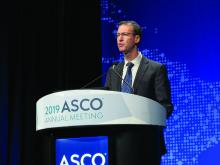CHICAGO – Higher levels of several immune markers confer better response and outcomes in patients with HER2-positive breast cancer treated with trastuzumab and pertuzumab, according to a comprehensive biomarker analysis of data from the randomized, phase 3 APHINITY trial.
APHINITY randomized 4,805 patients with HER2-positive breast cancer to adjuvant chemotherapy with trastuzumab plus either pertuzumab or placebo and demonstrated a small improvement of just 1.7% in invasive disease–free survival at 4 years with the addition of adjuvant pertuzumab. The current analysis involved a nested case-control assessment of 1,023 patient samples from the trial to identify “biomarkers beyond clinical parameters” that could identify subgroups of patients who might benefit more from the addition of pertuzumab, Ian E. Krop, MD, PhD, reported at the annual meeting of the American Society of Clinical Oncology.
The genomic and immune marker-based analysis included DNA, whole transcriptome, tumor-infiltrating lymphocytes (TILs), and HER2 analyses, and after adjustment for treatment, hormone receptor status, nodal status, age, and chemotherapy type. Topoisomerase II-alpha amplification and higher messenger RNA expression of an immune signature consisting of interferon-gamma (IFNG), programmed death-ligand 1 (PD-L1), and chemokine (C-X-C motif) ligand 9 (CXCL9) were associated with better prognosis (hazard ratios, 0.68 and 0.91, respectively), said Dr. Krop, associate chief of the division of breast oncology at the Susan F. Smith Center for Women’s Cancers and clinical research director of the breast oncology center at Dana-Farber Cancer Institute, both in Boston.
TILs also suggested better outcomes (HR, 0.91), and HER2 copy number of six or greater versus lower levels of HER2 copy number was also associated with better prognosis (HR, 0.68), he noted.
Conversely, PI3K/PTEN/AKT gene alterations and MYC and ZNF703 amplification each were associated with worse outcomes (HRs, 1.35, 1.61, and 1.62, respectively).
As for predictive value, no significant association was seen between any of the amplification events and benefit of pertuzumab, nor was an interaction seen between the three-gene signature and pertuzumab benefit, Dr. Krop said.
“But if you look at the individual genes and ... the highest quartiles of expression of these genes – particularly interferon gamma and CXCL9 – it did appear that there was a statistically significant improvement in the benefit of pertuzumab if you had the highest levels of these genes, compared to lower levels of these genes,” he added.
The hazard ratios for CXCL9 of 0%-75% and greater than 75%, for example, were 0.95 and 0.49, respectively.
The interaction P values for IFNG and CXCL9 were statistically significant, but a trend toward benefit with PD-L1 did not reach statistical significance, Dr. Krop noted.
As with IFNG and CXCL9, the highest quartiles of TILs also predicted greater pertuzumab benefit (HRs for TILs at 0-75% and greater than 75%, 0.95 and 0.35, respectively), and the association was highly significant (P = .003).
HER2 copy number of six or greater was also associated with significantly greater benefit with pertuzumab (HRs for copy number of six or greater vs. less than six, 0.75 and 1.41, respectively).
A trend was seen toward decreased benefit of pertuzumab in patients with P13K/PTEN/AKT alteration, but this was not statistically significant, he noted.
However, the trend, coupled with the poor prognosis found to be associated with P13K-altered cancers, “would suggest that we need to identify new therapies – alternative approaches – to maximize treatment benefit in this cancer subtype,” he said.
“This biomarker analysis is possibly the largest and most comprehensive to date in HER2-positive breast cancer,” Dr. Krop said, noting that the findings provide support for an immune-mediated mechanism of action for pertuzumab, and suggest a need for alternative therapies for patients with low levels of TILs or immune gene markers in order to maximize their outcomes.
“We hope these data will be useful to refine future trials of early-stage HER2-positive breast cancer,” he said.
Dr. Krop reported relationships – including employment, leadership, and stock ownership – with AMAG, as well as honoraria from Genentech/Roche; consulting or advisory roles with Context Therapeutics, Daiichi Sankyo, Genentech/Roche, MacroGenics, Seattle Genetics, and Taiho Pharmaceutical; and research funding from Genentech and Pfizer to his institution.
SOURCE: Krop IE et al. ASCO 2019, Abstract 1012 .


